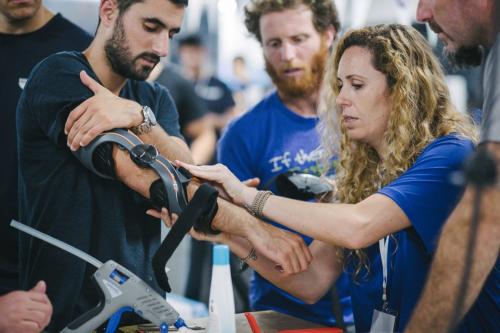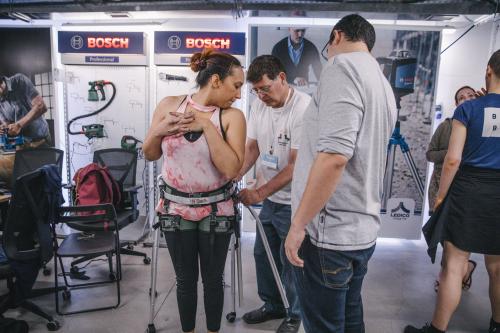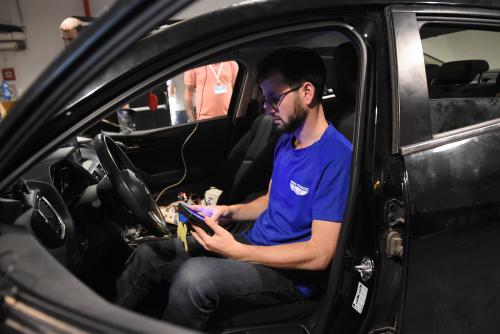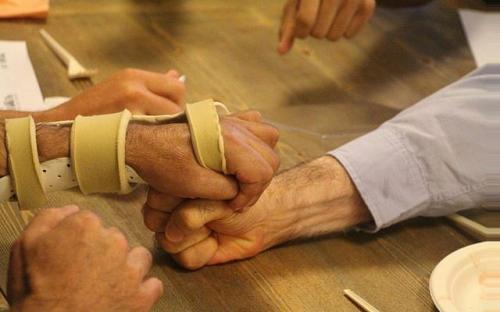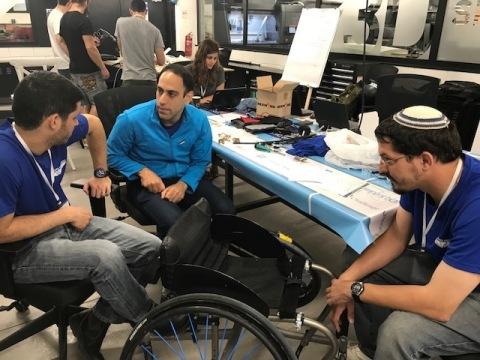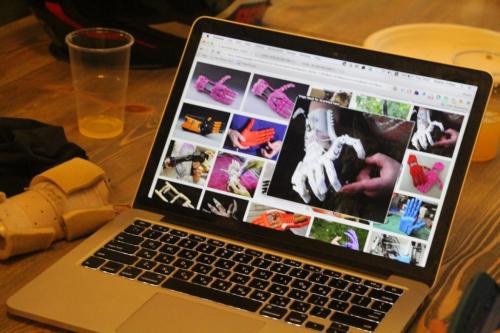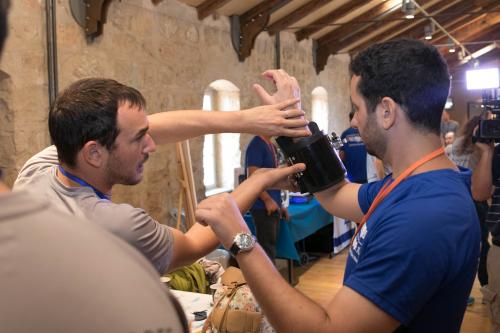‘Creating Miracles’
May 13, 2018 By eJP

Screen capture Facebook; Makers for Heroes / Maor Samana.
By Maayan Hoffman
eJewish Philanthropy
In 57 hours, Ido’s life was changed.
Ido was wounded in battle in Israel 22 years ago. Due to a paralyzed hip with a propensity to dislocate, he has been walking on crutches since the age of 20. But after three days (or 57 working hours) a team of makers has created a one-of-a-kind band that allows him to stand and walk for the first time since his accident.
“Doctors think of medical solutions,” said Shoshi Rushnevsky, vice president of product for Reut Group’s Tel Aviv-based Impact Labs. “Engineers thought of an engineering solution.”
In this case, these engineers were volunteers who participated earlier this month in the first-ever international Makers for Heroes event, which focused on creating innovative, affordable solutions to challenges faced by wounded war vets from Israel, America and France. The event was spearheaded by Tikkun Olam Makers (TOM) – whose hallmark is solutions based on the core principles of scalability, community integration, collaborative competition, affordability, smart development and innovation – in partnership with Israel-based Restart, Challenge America and the French army.
This event ran from April 30 to May 2 and included the participation of 13 need-knowers (wounded soldiers), and some 180 makers – strategic thinkers, engineers, designers and project managers.
Gidi Grinstein, president of American Friends of Reut and founder of the Reut Group, said there is often a belief that wounded soldiers are being taken care of by the government. And while reports indicate that Israel is at the forefront of serving her wounded, “a lot of needs are not being met.”
Take Assaf Dory. He served in the IDF and later moved to the United States, where he was wounded while serving in the Miami police force. His leg was amputated from the knee down, and his injury continues to cause him enough pain that he can not sit in the same chair or in the same position for more than 20 minutes at a time.
“He has a 9-year-old daughter, and he wants to sit and read with his daughter,” said Rushnevsky.
Now, he can.
The makers created for Dory a customized seat that fits his lower back, behind and legs and allows him to sit comfortably in regular chairs.
“I’ve seen him since the event,” said Rushnevsky. “He is carrying the seat around everywhere.”
For wounded Israeli vet Elad, who was blinded in one eye when he was shot in the head in 2014, the makers designed a censor for his car that enables him to drive safely.
For American veteran Zarita, who was once a talented dancer until an army injury caused brain damage that affects her balance, the makers provided a solution that allowed her to dance for the first time since she as hurt six years ago.
“You could see she was a skilled dancer before she was injured,” Grinstein said.
A little more than a week since the event, Rushnevsky said she is still trying to process what was an “overwhelming experience.” She said participants continue to call her daily, to share their own stories and emptions.
“We are creating miracles,” Rushnevsky said.
Houston Cowan, founder and CEO of Challenge America, said his organization operates on the Maimonidean value, “You give a poor man a fish and you feed him for a day. You teach him to fish and you give him an occupation that will feed him for a lifetime.” For Cowan, the make-a-thon was in line with this value, and “beat all expectations – and they were really high.”
Cowan said what most struck him about the experience was how these nearly 200 people came together for the first time, learned about the soldiers’ needs and came up with solutions, while at the same time building friendships that are as deep as family.
Cowan said Makers for Heroes helps share Israeli innovation internationally and has the potential to change the world.
“I was just literally blown away,” he said.
Vet Dory made the connection between TOM and Challenge America. Dory is a regular participant and Volunteer with Aspen, Col.-based Challenge America, where Dory now lives. He also maintains ties with Israel, where his parents still reside.
A Restart volunteer made the connection for Makers for Heroes to the French army, which sent an official delegation.
Grinstein said that this was the first major make-a-thon TOM held at Impact Labs since its opening in the end of 2017 and it proved effective. He said he now foresees more regular make-a-thons at the labs during the year and potentially working with more niche or targeted communities.
In the last year, TOM has been focusing on modeling the full TOM cycle from identifying needs to delivering products, publishing a TOM playbook and launching a web platform that would support TOM communities worldwide.
TOM recently launched TOM@University Communities, a year-round, cross-campus initiative to bring students together around the TOM mission, creating solutions all year and just around a make-a-thon event. The organization is also developing a partnership to help disseminate the TOM@HighSchool module to schools and community colleges.
“The story is not just one of this make-a-thon or that make-a-thon,” said Grinstein. “The story is the emerging scale of TOM.”

